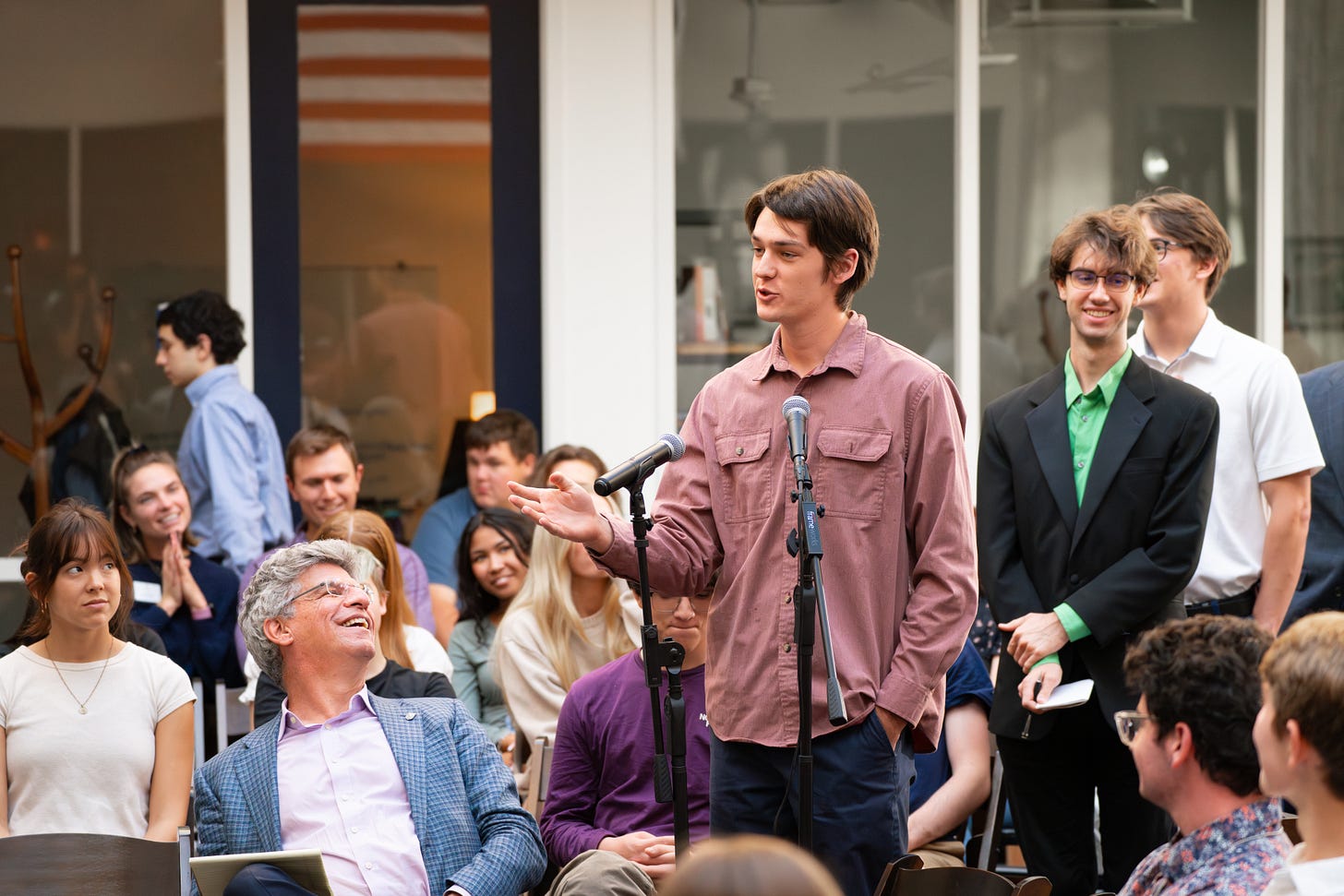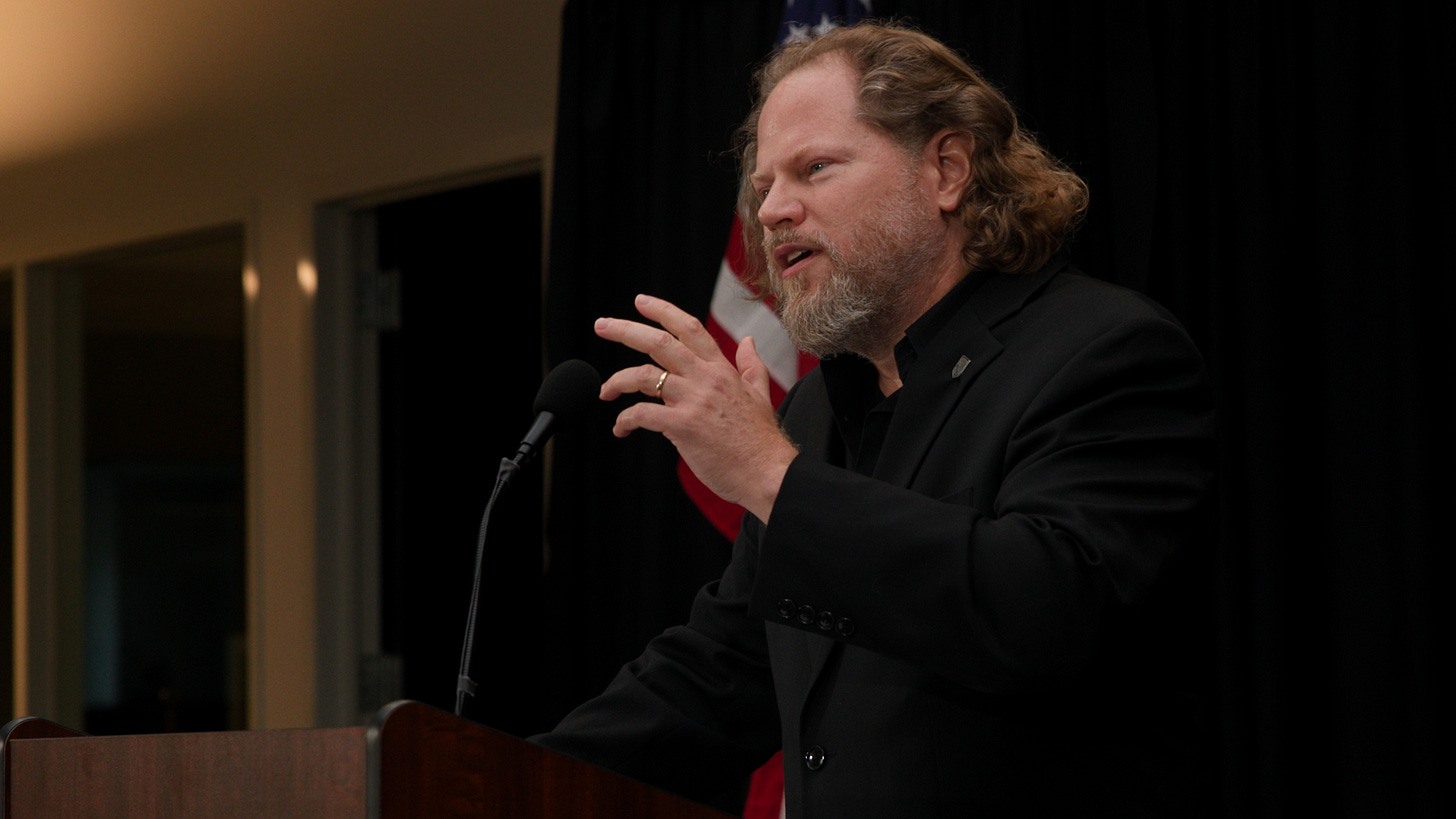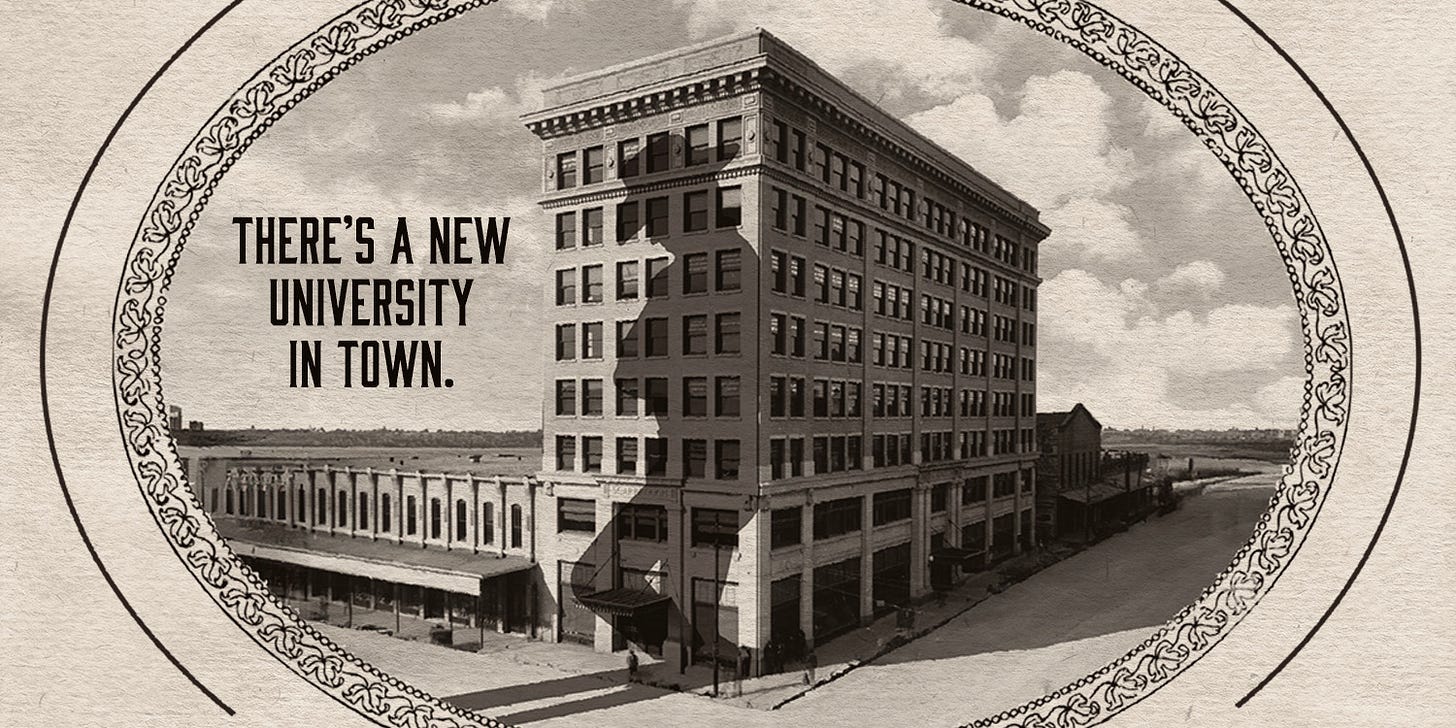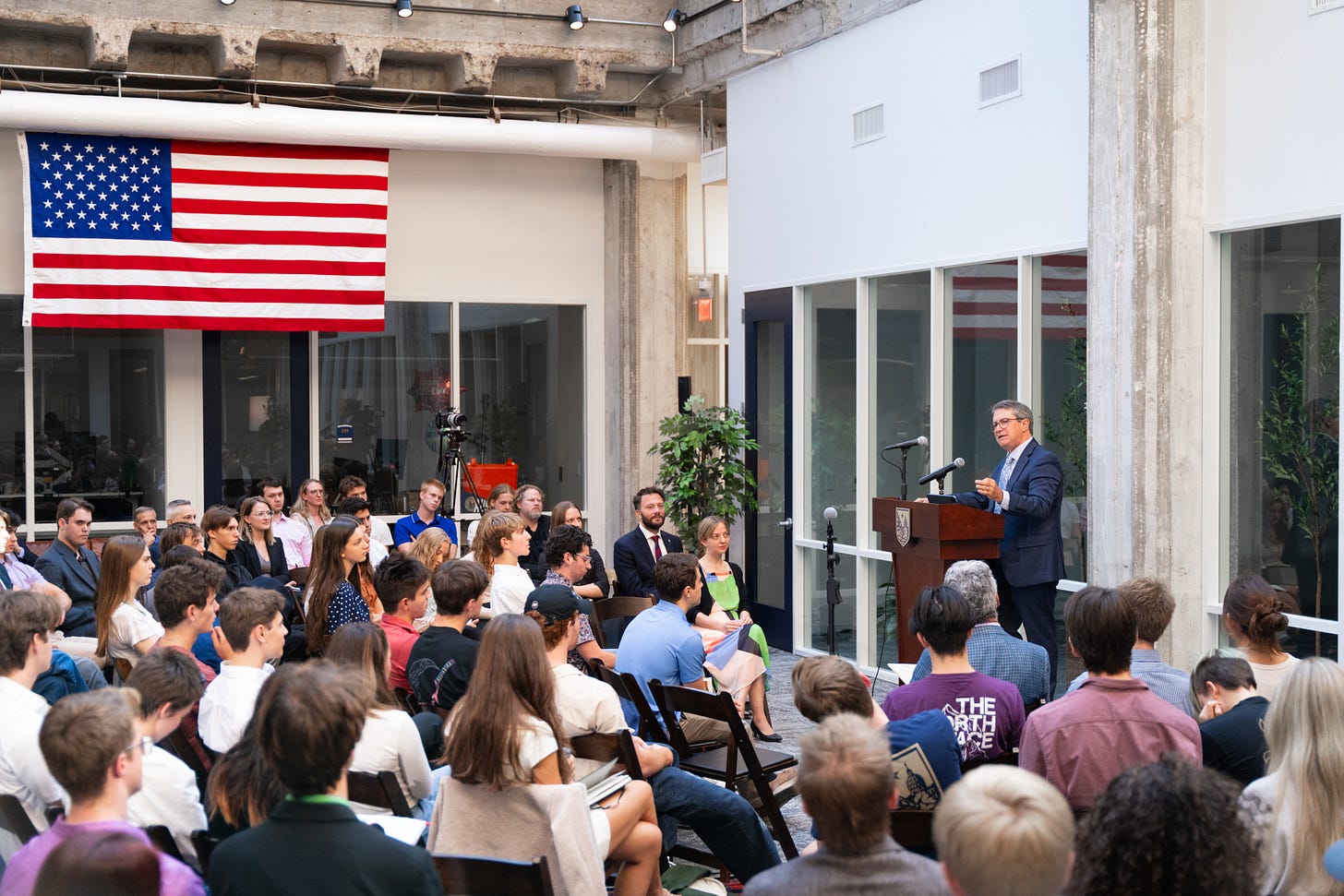Between Beasts and Gods
A visiting philosopher goes to the heart of Homer's Odyssey. Plus: Come see us in November!
The UATX adventure is a few days past the one-month mark, and our students’ first midterms just ended.
Last week, we were honored to welcome the political philosopher and author Patrick Deneen to speak about Homer’s Odyssey—a foundational text of our curriculum—and the perennial human temptation to deny our own nature.
“The Odyssey is a deep dive into questions of what it is to be a human being, particularly the eternal temptations to be less than human and more than human, to be more like a beast or a god,” Deneen told UATX. “And this seems to be a relevant theme in an age in which we have temptations in both directions.
“Odysseus shows us that there's no avoiding the temptation to be something other than human, whether through deficiency or excess,” he said.
Patrick J. Deneen is Professor of Political Science and holds the David A. Potenziani Memorial Chair of Constitutional Studies at the University of Notre Dame. His interests and research areas include ancient political thought, American political thought, liberalism, conservatism, religion and politics, and literature and politics. He has edited three books and written four, including Why Liberalism Failed (2018), which was translated into over twenty languages and praised by former President Barack Obama.
At UATX, Deneen returned to his roots to discuss themes from his first book, The Odyssey of Political Theory (2000).
“You're beginning here at UATX by reading The Odyssey, and it should remain with you throughout your time here and the rest of your lives because it is fundamentally about the questions you cannot escape,” he said.
“The Odyssey is the text of beasts and gods, and that human creature somehow living between the two, naturally discontent with our condition as human beings.
“To be a beast is simply to be, to exist through instinct, and at the other extreme, the temptation to be like a god, and especially to be autonomous, to be immortal, not to be subject to the ultimate decline and mortality that is human life.”
Deneen described our discontent with our humanity as a perennial problem. Yet he suggested that, like Odysseus, we might err on the side of the lesser evil.
“The reason we talk about Odysseus and not the nameless men who would eat with the Lotus Eater is because his temptation is toward the high, toward knowledge, spending a lot of time with immortal beings, even if he himself doesn't embrace immortality,” he said. “I think that's particularly instructive because, at every turn, we are surrounded by temptations for the beastly or the deficient.
“What are we in today's world, but constantly barraged by temptations of the lotus, of living life in a kind of unconscious way, a way of hedonism and distraction and pleasure that makes us largely unconscious creatures?
“How many opportunities or temptations do we have for the high, the divine, the immortal, knowledge that transcends our time and place, something beyond ourselves?
“It seems our civilization has settled very much for the temptation of being less than ourselves.
“And if nothing else, a reading of the Odyssey might instruct us that it's unavoidable, in some ways, to be tempted to be more or less than human, but if given the temptation, aim toward that which is higher than ourselves, even if we understand and recognize that we must and indeed cannot otherwise be anything other than human.”
UATX Poll Shows Plurality Distrust Higher Ed
Today, UATX released its first poll, sponsored by the UATX Center for Economics, Politics, and History in partnership with Hunt Research, surveying 1,000+ likely Pennsylvania voters about the upcoming 2024 presidential election and their views on higher education.
“Trust in higher education has become a key factor in vote choice,” said Morgan Marietta, Dean of Economics, Politics & History at the University of Austin. “Many Americans have concluded that universities cannot be trusted to provide accurate information or an education free of political bias."
“Voters support the policies of the new University of Austin as a path toward increasing trust, which is desperately needed in our polarized society,” he said.
Key findings on trust in colleges and universities include:
A plurality of likely voters (49%) do not trust colleges and universities to provide students with an education free of political bias. Overall, 55% of Pennsylvania voters distrust higher education.
Strong pluralities agree that specific higher ed reforms would increase trust: prohibiting colleges from considering race, ethnicity, religion or gender in admissions (46%), balancing the faculty with conservative and liberal professors (45%), and encouraging students to speak their minds, regardless of whether their views are popular (59%).
Voters who trust higher education institutions are voting 81% for Harris and 16% for Trump while those who distrust them are voting 76% for Trump and 20% for Harris.
PA voters with a bachelor’s degree or higher are voting for Harris 56% to 39%, while those who have not attained a bachelor’s degree favor Trump by a similar margin, 57% to 39%.
Key General Election findings include:
A statistical dead heat between Donald Trump and Kamala Harris, with Trump up by 1%, within the poll’s margin of error. When Libertarian and Green candidates Chase Oliver and Jill Stein are included, Trump’s lead falls to 0.2%.
Harris is winning new voters (those with no previous history of voting in a General Election since 2012) by a margin of 51% to 43% and winning low-propensity voters (those with only one or two votes since 2012) 55% to 39%; Trump is winning high-propensity voters (three or more votes since 2012) 53% to 44%.
Women support Harris 55% to 41%, and men support Trump 57% to 39%. Harris leads among voters under 35 by more than two to one and among those 35-49 by 8%; Trump leads by 15% among voters 50-64 and is up 18% with seniors 65+.
Overall, voters who are middle class, upper middle class, or upper class (defined as reporting >$80k annual household income) favor Harris 53% to 44%.
The survey was conducted from October 2-7, 2024, surveying 1,037 likely 2024 General Election Voters in Pennsylvania. The survey’s margin of sampling error is +/- 3.04%.
The Mill Institute at UATX Presents The Democracy Project
Next, I’m pleased to share an announcement from The Mill Institute at UATX introducing a new resource for educators and parents looking to help students explore opposing viewpoints during this contentious election season while breaking out of a right/left political frame.
What does abortion have to do with economics?
What is the relationship between gun rights and mental health?
Is the amount of immigration as important as the type?
The Mill Institute’s Democracy Project is a collection of educational resources designed to support teachers as they engage students in many complex issues that divide us, including abortion, immigration, gun rights, economic inequality, and free speech. Each topic includes curated articles, student exercises, and discussion questions to explore the issues from various entry points, leading to a more rigorous and nuanced understanding. It is a project focused not on what we think but on how we think and the consequences of our ideas for a thriving democracy.
Access and share The Democracy Project here!
The Mill Institute at UATX works to promote an open and rigorous exchange of ideas across high school and university communities and classrooms. Their programs and resources, including The Democracy Project, create a foundation for open dialogue, helping students challenge the belief that sensitive topics tied to identity, justice, or equality have obvious or easy answers.
Don’t miss our November Open House!
On behalf of the UATX Office of Admissions, I invite you to visit our Scarbrough campus in Austin and witness the fearless pursuit of truth in action.
Whether you're interested in joining the class of 2029 or simply learning more about what UATX is all about, don’t miss our next Open House on Friday, November 8, 2024. Meet our faculty and students, learn about our undergraduate degree program, ask our Admissions team questions, and start your application for Fall 2025.
Every student admitted to and enrolled in the Class of 2029 will receive a four-year, full tuition scholarship.
Attendance is free. Register here.
Maggie Kelly is the Communications Manager at the University of Austin. Write to her at mkelly@uaustin.org.











Profane/sacred, beastly/godlike, dichotomous thinking has been a barrier to our development. Rather, we need better understandings of the biological and environmental interactions that promote human flourishing.